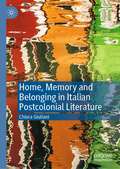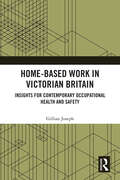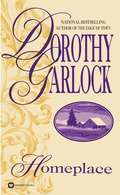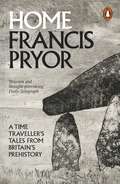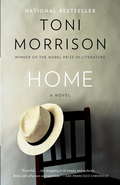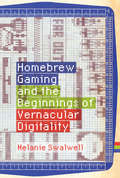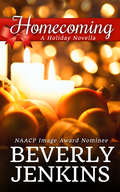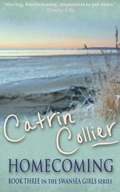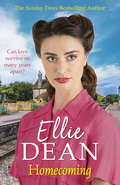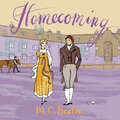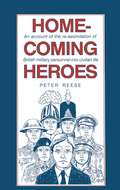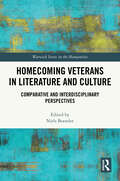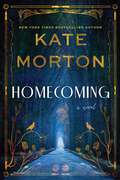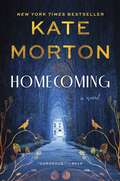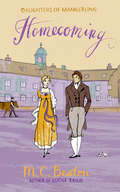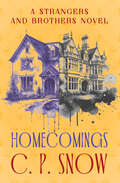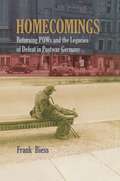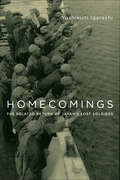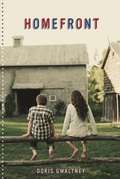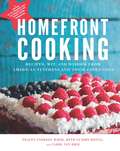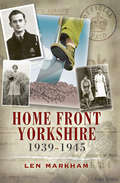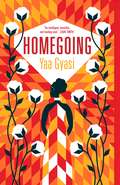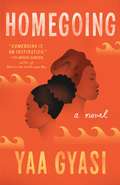- Table View
- List View
Home to the Prairie (The Days of Laura Ingalls Wilder, Book #4)
by T. L. TedrowWhen Pa comes to visit the farm in Missouri, he and Laura have so much fun reminiscing about the old days that they decide to set out in search of their old homestead, and on the way they relive many of the special memories of their past.
Home, Memory and Belonging in Italian Postcolonial Literature
by Chiara GiulianiThis book examines the meaning of home through the investigation of a series of public and private spaces recurrent in Italian postcolonial literature. The chapters, by respectively considering Termini train station in Rome, phone centres, the condominium, and the private spaces of the bathroom and the bedroom, investigate how migrant characters inhabit those places and turn them into familiar spaces of belonging. Home, Memory and Belonging in Italian Postcolonial Literature suggests “home spaces” as a possible lens to examine these specific places and a series of practices enacted by their inhabitants in order to feel at home. Drawing on a wide array of sources, this book focuses on the role played by memory in creating transnational connections between present and past locations and on how these connections shape migrants’ sense of self and migrants’ identity.
Home-based Work in Victorian Britain: Insights for Contemporary Occupational Health and Safety
by Gillian JosephHome- based work has increased in recent decades and intensified as a result of policies created to control the spread of COVID-19, creating a labour market in rapid transition. Yet little attention has been paid to the issues associated with occupational health and safety or to how employers will monitor and maintain employee health and safety in a home- based work environment. Using historical case studies from Victorian Britain, this book reflects on the past to examine resurfacing health and safety concerns that shaped, and continue to shape, the home- based working experience. Anchored by family research case studies, this book presents documents and newspaper accounts about the diverse experiences of three real people who lived and worked from their homes in the Victorian era. Supported by academic and popular literature on work and policy about the era, the book discusses changing worldviews and social context that shaped occupational health and safety at the time and critiques the outcomes of policies that were challenged to address these risks. The case study experiences are used as a touchstone between the past and present to draw parallels between important health and safety concerns that may be resurfacing in our modern post-COVID transition to home-based work. This book will be a valuable resource for researchers, academics and postgraduate students of occupational health and safety, occupational science, labour history and human resource management, as well as Victorian studies. It will also be of interest to policymakers and practitioners working across the fields of workplace and occupational health and safety.
Home-place
by Dorothy GarlockAfter the death of her stepdaughter, Ana struggles to raise her late stepdaughter's child in a dangerous situation, but soon finds a new way to dream.
Home: A Time Traveller's Tales from Britain's Prehistory
by Francis PryorIn Home Francis Pryor, author of The Making of the British Landscape, archaeologist and broadcaster, takes us on his lifetime's quest: to discover the origins of family life in prehistoric BritainFrancis Pryor's search for the origins of our island story has been the quest of a lifetime. In Home, the Time Team expert explores the first nine thousand years of life in Britain, from the retreat of the glaciers to the Romans' departure. Tracing the settlement of domestic communities, he shows how archaeology enables us to reconstruct the evolution of habits, traditions and customs. But this, too, is Francis Pryor's own story: of his passion for unearthing our past, from Yorkshire to the west country, Lincolnshire to Wales, digging in freezing winters, arid summers, mud and hurricanes, through frustrated journeys and euphoric discoveries. Evocative and intimate, Home shows how, in going about their daily existence, our prehistoric ancestors created the institution that remains at the heart of the way we live now: the family.'Under his gaze, the land starts to fill with tribes and clans wandering this way and that, leaving traces that can still be seen today . . . Pryor feels the land rather than simply knowing it' - Guardian Former president of the Council for British Archaeology, Dr Francis Pryor has spent over thirty years studying our prehistory. He has excavated sites as diverse as Bronze Age farms, field systems and entire Iron Age villages. He appears frequently on TV's Time Team and is the author of The Making of the British Landscape, Seahenge, as well as Britain BC and Britain AD, both of which he adapted and presented as Channel 4 series.
Home: A novel (Vintage International)
by Toni MorrisonNATIONAL BESTSELLER • A New York Times Notable Book • From the acclaimed Nobel Prize winner: an emotional powerhouse of a novel about a modern Odysseus returning to a 1950s America mined with lethal pitfalls for an unwary Black manWhen Frank Money joined the army to escape his too-small world, he left behind his cherished and fragile little sister, Cee. After the war, he journeys to his native Georgia with a renewed sense of purpose in search of his sister, but it becomes clear that their troubles began well before their wartime separation. Together, they return to their rural hometown of Lotus, where buried secrets are unearthed and where Frank learns at last what it means to be a man, what it takes to heal, and—above all—what it means to come home.
Homebrew Gaming and the Beginnings of Vernacular Digitality (Game Histories)
by Melanie SwalwellThe overlooked history of an early appropriation of digital technology: the creation of games though coding and hardware hacking by microcomputer users.From the late 1970s through the mid-1980s, low-end microcomputers offered many users their first taste of computing. A major use of these inexpensive 8-bit machines--including the TRS System 80s and the Sinclair, Atari, Microbee, and Commodore ranges--was the development of homebrew games. Users with often self-taught programming skills devised the graphics, sound, and coding for their self-created games. In this book, Melanie Swalwell offers a history of this era of homebrew game development, arguing that it constitutes a significant instance of the early appropriation of digital computing technology. Drawing on interviews and extensive archival research on homebrew creators in 1980s Australia and New Zealand, Swalwell explores the creation of games on microcomputers as a particular mode of everyday engagement with new technology. She discusses the public discourses surrounding microcomputers and programming by home coders; user practices; the development of game creators' ideas, with the game Donut Dilemma as a case study; the widely practiced art of hardware hacking; and the influence of 8-bit aesthetics and gameplay on the contemporary game industry. With Homebrew Gaming and the Beginnings of Vernacular Digitality, Swalwell reclaims a lost chapter in video game history, connecting it to the rich cultural and media theory around everyday life and to critical perspectives on user-generated content.
Homecoming
by Beverly JenkinsA historical holiday story of homecoming and second-chance romance by NAACP Image Award Nominee, Beverly Jenkins. In 1883, Lydia Cooper is happily traveling back home to celebrate the simple joys of the holidays when an unexpected complication appears in the all-too-distracting form of Gray Dane, the man she loved as a girl; the man she left behind. Gray, a soldier, is finally returning home too. Seeing Lydia after fifteen years reignites all the temptations from years ago...and also the pain and regret. But as Lydia and Gray make their way home together, they get a chance to mend the past, and rediscover the joy, trust --and passion -- of before; to realize that love isn't just sweeter the second time around, it's downright decadent. This novella was previously published in Gettin' Merry, A Holiday Anthology
Homecoming
by Catrin CollierDr Grace Harper has loved the stories of Robin Hood ever since she first saw them on TV as a girl. Now, with her fortieth birthday just around the corner, she's a successful academic in Medieval History, with a tenured position at a top university. But Grace is in a bit of a rut. She's supposed to be writing a textbook on a real-life medieval gang of high-class criminals - the Folvilles - but she keeps being drawn into the world of the novel she's secretly writing - a novel which entwines the Folvilles with her long-time love of Robin Hood - and a feisty young girl named Mathilda, who is the key to a medieval mystery... Meanwhile, Grace's best friend Daisy - who's as keen on animals as Grace is on the Merry Men - is unexpectedly getting married, and a reluctant Grace is press-ganged into being her bridesmaid. As Grace sees Daisy's new-found happiness, she starts to re-evaluate her own life. Is her devotion to a man who may or may not have lived hundreds of years ago really a substitute for a real-life hero of her own? It doesn't get any easier when she meets Dr Robert Franks - a rival academic who Grace is determined to dislike but finds herself being increasingly drawn to...
Homecoming (The Cliffehaven Series #18)
by Ellie Dean**************THE EIGHTEENTH CLIFFEHAVEN NOVEL BY SUNDAY TIMES BESTSELLING AUTHOR ELLIE DEANPeace has finally been declared in the Far East, but for those living at Beach View Boarding House, the news brings mixed emotions. Peggy Reilly is devastated that her husband Jim will not be coming home for Christmas. And Sarah and Jane, who have lived at Beach View throughout much of the conflict, dread what they will find when they go back to Singapore. Life in Cliffehaven is in a whirlwind of change as the men return from the war and Peggy’s evacuee chicks begin to spread their wings and start new lives in different corners of the world.Peggy and Jim have longed to be together after so many years apart, but war has left them profoundly changed. Can they rekindle the loving, close relationship they’d shared before?
Homecoming (The Daughters of Mannerling Series)
by M.C. BeatonLizzie is the sixth and youngest daughter of the late Sir Beverley, the patriarch who gambled away their beloved estate, Mannerling. Each of Lizzie's sisters had been entrusted by their ambitious mother to cast lures for the various owners of their former home. Instead, each one happily married for love. Now it's Lizzie's turn to save Mannerling.Yet the new owner, the Duke of Severnshire, is far too arrogant for Lizzie's heart. And while the duke has no intentions toward the saucy chit, her curt dismissal of him is perplexing--for no woman has ever refused him! Now, as his lavish house party to select a bride becomes a whirlwind of mismatches and scandal, lovely Lizzie is turning the duke's own thoughts away from a suitable marriage--to the wonders of falling in love!
Homecoming Heroes: An Account of the Re-assimiliation of British Military Personnel into Civilian Life
by Peter ReeseIt is a sad and shaming but indisputable fact that the reception according to British soldiers on returning to civilian life has for centuries been little short of disgraceful, and even in this more enlightened age compares unfavourably with that of many other countries. In Homecoming Heroes Peter Reese ex-amines the lot of British veteran (often still quite a young man) on leaving the Armed Forces and assesses the chances of finding suitable employment after his discharge. His survey covers a wide canvas, going back to the earliest days of the British Army and reveals a sorry tale in which neglect was often the only alternative to downright hostility. It is not a story to swell the British breast with pride. The efforts of Charles II, founder of Chelsea Royal Hospital, and later those of the benevolent Marquis of Granby notwithstanding, it was not until the later part of the 19th century that an awakening of social conscience stirred certain philanthropic individuals into action. Ironically Government reaction was not to the veterans advantage: 'If the matter is now in private hands' they argues, 'why should we interfere?' Mass conscription in two world wars has helped considerable to help break down this uncaring viewpoint, but much, as Peter Reese forcefully points out, remains to be done. Let us hope that this timely book will help ameliorate the lot of those about to be cast upon a shrinking job market as a result of the recently announced defence cuts.
Homecoming Veterans in Literature and Culture: Comparative and Interdisciplinary Perspectives (Warwick Studies in the Humanities)
by Niels BoenderFrom Homer’s Odyssey itself, the return of the veteran to his or her home has been a central trope of the literary canon. Huge bureaucracies and a panoply of global organisations are deeply concerned with facilitating a painless return to stable homes. This book presents ‘homecoming’ as an analytical lens to better understand veterans’ return and reintegration after conflict. Home is held to be multidimensional, a concept encapsulating the physical and the social, particularly disrupted by experiences of violence. Homecoming is, therefore, not a mere moment but a process that can unfold over years and decades as old and new bonds of familiarity are forged. Struggles over the home and homecoming are, moreover, endlessly political, bound up in questions of identity and the nation. Looking across times, places, and disciplines, the collection centres both historical and representational approaches to veterancy.
Homecoming: A Novel
by Kate MortonThe highly anticipated new novel from the New York Times and #1 Globe and Mail bestselling author of The Clockmaker&’s Daughter, a sweeping saga that begins with a shocking crime that echoes across continents and generations.Adelaide Hills, Christmas Eve, 1959 At the end of a scorching hot day, beside a creek in the grounds of a grand country house, a local man makes a terrible discovery. Police are called, and the small town of Tambilla becomes embroiled in one of the most baffling murder investigations in the history of South Australia. Many years later and thousands of miles away, Jess is a journalist in search of a story. Having lived and worked in London for nearly two decades, she now finds herself unemployed and struggling to make ends meet. A phone call summons her back to Sydney, where her beloved grandmother, Nora, who raised Jess when her mother could not, has suffered a fall and is seriously ill in hospital. At Nora&’s house, Jess discovers a true crime book chronicling a long-buried police case: the Turner Family Tragedy of 1959. It is only when Jess skims through its pages that she finds a shocking connection between her own family and this notorious event—a murder mystery that has never been satisfactorily resolved. An epic story that spans generations, Homecoming asks what we would do for those we love, how we protect the lies we tell, and what it means to come home. Above all, it is an intricate and spellbinding novel from one of the finest writers working today.
Homecoming: A Novel
by Kate MortonThe highly anticipated new novel from the New York Times bestselling author of The Clockmaker’s Daughter, a sweeping novel that begins with a shocking crime, the effects of which echo across continents and generations. <p><p>Adelaide Hills, Christmas Eve, 1959: At the end of a scorching hot day, beside a creek on the grounds of a grand country house, a local man makes a terrible discovery. Police are called, and the small town of Tambilla becomes embroiled in one of the most baffling murder investigations in the history of South Australia. <p><p>Many years later and thousands of miles away, Jess is a journalist in search of a story. Having lived and worked in London for two decades, she now finds herself unemployed and struggling to make ends meet. A phone call out of nowhere summons her back to Sydney, where her beloved grandmother Nora, who raised Jess when her mother could not, has suffered a fall and is seriously ill in the hospital. <p><p>At Nora's house, Jess discovers a true crime book chronicling a long-buried police case: the Turner Family Tragedy of 1959. It is only when Jess skims through its pages that she finds a shocking connection between her own family and this notorious event—a mystery that has never been satisfactorily resolved. <p><p>An epic story that spans generations, Homecoming asks what we would do for those we love, how we protect the lies we tell, and what it means to come home. Above all, it is an intricate and spellbinding novel from one of the finest writers working today. <p> <b>New York Times Bestseller</b>
Homecoming: A Novel Of Regency England - Being The Sixth Volume Of The Daughters Of Mannerling (The Daughters of Mannerling Series)
by M.C. BeatonLizzie is the sixth and youngest daughter of the late Sir Beverley, the patriarch who gambled away their beloved estate, Mannerling. Each of Lizzie's sisters had been entrusted by their ambitious mother to cast lures for the various owners of their former home. Instead, each one happily married for love. Now it's Lizzie's turn to save Mannerling.Yet the new owner, the Duke of Severnshire, is far too arrogant for Lizzie's heart. And while the duke has no intentions toward the saucy chit, her curt dismissal of him is perplexing--for no woman has ever refused him! Now, as his lavish house party to select a bride becomes a whirlwind of mismatches and scandal, lovely Lizzie is turning the duke's own thoughts away from a suitable marriage--to the wonders of falling in love!
Homecomings (The Strangers and Brothers Novels)
by C.P. SnowAn emotionally devastated widower is drawn to a married woman in this &“impressive&” novel set in wartime England (Kirkus Reviews). Lewis Eliot has lost his deeply troubled wife, Sheila, under tragic circumstances. While her suicide has shaken Lewis to his core, it has also put an end to a painful and difficult marriage. In the wake of Sheila&’s passing and Britain entering the Second World War, Lewis plunges into his civil service work. During this time, he meets Margaret and begins to feel his heart stirring—and sees the possibility of healing. But Margaret already has a husband, severely complicating the attraction they both feel, in this series of historical novels that the Telegraph called &“Balzacian masterpieces of the age.&” &“A master craftsman in fiction.&” —The New York Times &“An extremely shrewd observer of men and society.&” —Commentary
Homecomings: Returning POWs and the Legacies of Defeat in Postwar Germany
by Frank BiessThis book focuses on one of the most visible and important consequences of total defeat in postwar Germany: the return to East and West Germany of the two million German soldiers and POWs who spent an extended period in Soviet captivity. These former prisoners made up a unique segment of German society. They were both soldiers in the war of racial annihilation on the Eastern front and then suffered extensive hardship and deprivation themselves as prisoners of war. The book examines the lingering consequences of the soldiers' return and explores returnees' own responses to a radically changed and divided homeland. Historian Frank Biess traces the origins of the postwar period to the last years of the war, when ordinary Germans began to face the prospect of impending defeat. He then demonstrates parallel East and West German efforts to overcome the German loss by transforming returning POWs into ideal post-totalitarian or antifascist citizens. By exploring returnees' troubled adjustment to the more private spheres of the workplace and the family, the book stresses the limitations of these East and West German attempts to move beyond the war. Based on a wide array of primary and secondary sources, Homecomings combines the political history of reconstruction with the social history of returnees and the cultural history of war memories and gender identities. It unearths important structural and functional similarities between German postwar societies, which remained infused with the aftereffects of unprecedented violence, loss, and mass death long after the war was over.
Homecomings: The Belated Return of Japan's Lost Soldiers (Studies of the Weatherhead East Asian Institute, Columbia University)
by Yoshikuni IgarashiSoon after the end of World War II, a majority of the nearly 7 million Japanese civilians and serviceman who had been posted overseas returned home. Heeding the call to rebuild, these veterans helped remake Japan and enjoyed popularized accounts of their service. For those who took longer to be repatriated, such as the POWs detained in labor camps in Siberia and the fighters who spent years hiding in the jungles of islands in the South Pacific, returning home was more difficult. Their nation had moved on without them and resented the reminder of a humiliating, traumatizing defeat. Homecomings tells the story of these late-returning Japanese soldiers and their struggle to adapt to a newly peaceful and prosperous society. Some were more successful than others, but they all charted a common cultural terrain, one profoundly shaped by media representations of the earlier returnees. Japan had come to redefine its nationhood through these popular images. Yoshikuni Igarashi explores what Japanese society accepted and rejected, complicating the definition of a postwar consensus and prolonging the experience of war for both Japanese soldiers and the nation. He throws the postwar narrative of Japan's recovery into question, exposing the deeper, subtler damage done to a country that only belatedly faced the implications of its loss.
Homefront
by Doris GwaltneyFor as long as Margaret Ann Motley can remember, she has been waiting and hoping for one thing -- a room to call her very own. And when Margaret's older sister leaves for college, it looks like Margaret's days of waiting are over. But then disaster strikes. Its form: an English cousin named Courtney who has been forced to flee 1941 London because of the blitz. Not at all concerned with what's happening in Europe, Margaret Ann is soon fighting a war of her own as she watches her cousin Courtney get not only her room, but also the attention of her very own family and boyfriend. It's not until Margaret's only brother enlists in the navy that Margaret discovers an ally and a friend where at first she saw only a rival. Poet and novelist Doris Gwaltney has crafted a detailed, spirited, sometimes humorous, and always deeply felt novel about two girls coming of age and becoming friends in the shadow of the biggest war in modern history.
Homefront 911
by Stacy BannermanThe hallmarks of America’s War on Terror have been repeated long deployments and a high percentage of troops returning with psychological problems. Family members of combat veterans are at a higher risk of potentially lethal domestic violence than almost any other demographic; it’s estimated that one in four children of active-duty service members have symptoms of depression; and nearly one million veterans of Iraq and Afghanistan require increased care due to physical or psychological trauma. But, despite these staggering trends, civilian America has not been mobilized to take care of the families left behind; the American Homefront, which traditionally has been rallied to support the nation’s war efforts, has disappeared. In Homefront 911 Stacy Bannerman, a nationally-recognized advocate for military families, provides an insider’s view of how more than a decade of war has contributed to the emerging crisis we are experiencing in today’s military and veteran families as they battle with overwhelmed VA offices, a public they feel doesn’t understand their sacrifices, and a nation that still isn’t fully prepared to help those who have given so much. Bannerman, whose husband served in Iraq, describes how extended deployments cause cumulative, long-lasting strain on families who may not see their parent, child, or spouse for months on end. She goes on to share the tools she and others have found to begin to heal their families, and advocates policies for advancing programs, services, and civilian support, all to help repair the broken agreement that the nation will care for its returning soldiers and their families. Skyhorse Publishing, as well as our Arcade imprint, are proud to publish a broad range of books for readers interested in history--books about World War II, the Third Reich, Hitler and his henchmen, the JFK assassination, conspiracies, the American Civil War, the American Revolution, gladiators, Vikings, ancient Rome, medieval times, the old West, and much more. While not every title we publish becomes a New York Times bestseller or a national bestseller, we are committed to books on subjects that are sometimes overlooked and to authors whose work might not otherwise find a home.
Homefront Cooking: Recipes, Wit, and Wisdom from American Veterans and Their Loved Ones
by Tracey Enerson WoodAn intersection of three inseparable features of military life: stories, family, and food. Food brings families and friends together, providing not only nourishment for our bodies, but also the glue that holds our families and society together. It is around the dinner table that we interact and important announcements are made—it was chow time in the foxholes when soldiers came to know each other, forming bonds so strong they would risk their own lives for one another. Remembering the smells and tastes of home support many in difficult times, those memories captured here in photographs and recipes. Home Front Cooking brings you a collection of treasured family recipes and photographs from military service members past and present, and their loved ones. Recipes are accompanied by brief stories and memories related to the recipe, military service, and/or lifestyle. The stories range from anecdotes passed down from great-great grandfathers who served in the American Civil War, to tales of terrified family members caught in a foreign country when John F. Kennedy was shot, to the stories of service members serving in Afghanistan and Iraq today. Many are heartwarming, some are humorous, most are bittersweet. All are written with a sense of pride and passion, and offer a glimpse of a lifestyle that is as unique as it is challenging. All authors’ profits will be donated to a charitable organization in support of veterans.
Homefront Yorkshire, 1939–1945: 1939-1945
by Len MarkhamNo event in history had such a profound and long-term effect as World War Two, it's consequences still helping to shape the modern world. With our trade routes harassed by U-boats, our skies darkened by the Luftwaffe and our beaches imperilled by the threat of invasion, the period from 1939 to 1945 was a frightening one for ordinary civilians. But the people of Yorkshire responded to the challenge with incredible fortitude, camaraderie, determination and good humour, the tireless efforts of armies of civilians keeping the British lamp of freedom trimmed. This unique compendium of many never-before-published personal reminiscences from the Yorkshire home front paints an astonishing picture of life in the war torn county. It records the tender and sometimes hilarious adventures of boys and girls, the selfless grind of workers in the mines and factories, the exhausting labours in allotments and fields and the bravery and dedication of the emergency services and other dedicated professionals who just put on their tin hats and worked on. Consigned to the memory banks for nearly seven decades, these stirring remembrances reveal the wealth of ingenuity and invention and the passionate bulldog spirit that kept our hopes alive during our darkest hours, the author also touching on the less heroic aspects of the period.
Homegoing
by Yaa GyasiA novel of exceptional scope and sweeping vision that traces the descendants of two sisters across three hundred years in Ghana and America.A riveting kaleidoscopic debut novel and the beginning of a major career: Yaa Gyasi's Homegoing is a novel about race, history, ancestry, love and time, charting the course of two sisters torn apart in 18th century Africa through to the present day. Two half sisters, Effia and Esi, unknown to each other, are born into two different tribal villages in 18th century Ghana. Effia will be married off to an English colonist, and will live in comfort in the sprawling, palatial rooms of Cape Coast Castle, raising "half-caste" children who will be sent abroad to be educated in England before returning to the Gold Coast to serve as administrators of the Empire. Her sister, Esi, will be imprisoned beneath Effia in the Castle's women's dungeon, before being shipped off on a boat bound for America, where she will be sold into slavery. Stretching from the tribal wars of Ghana to slavery and Civil War in America, from the coal mines in the north to the Great Migration to the streets of 20th century Harlem, Yaa Gyasi has written a modern masterpiece, a novel that moves through histories and geographies and--with outstanding economy and force--captures the intricacies of the troubled yet hopeful human spirit.
Homegoing: A novel
by Yaa GyasiINTERNATIONAL BESTSELLER • WINNER OF THE NATIONAL BOOK CRITICS CIRCLE'S JOHN LEONARD PRIZE • WINNER OF THE PEN / HEMINGWAY AWARD FOR DEBUT FICTION • Ghana, eighteenth century: two half sisters are born into different villages, each unaware of the other. One will marry an Englishman and lead a life of comfort in the palatial rooms of the Cape Coast Castle. The other will be captured in a raid on her village, imprisoned in the very same castle, and sold into slavery. One of Oprah&’s Best Books of the Year, Homegoing follows the parallel paths of these sisters and their descendants through eight generations: from the Gold Coast to the plantations of Mississippi, from the American Civil War to Jazz Age Harlem. Yaa Gyasi&’s extraordinary novel illuminates slavery&’s troubled legacy both for those who were taken and those who stayed—and shows how the memory of captivity has been inscribed on the soul of our nation.

